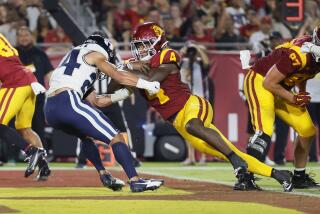Even Mind Game Isn’t in Trojans’ Favor This Year
- Share via
Is this a team in need of professional help?
At some point, it no longer makes sense to keep asking USC players for answers they obviously don’t have.
How could you lose a 21-point lead?
How could you do it again?
Do you know only three teams in USC history have lost five games in a row during the same season?
Or that you’re tied for last in the Pacific 10?
And what about UCLA?
Will you ever win again?
Maybe it’s time for the Trojans to recline on the nearest couch--except there might not be any answers there, either.
“I’m sure if I knew, I’d be hailed as the great disciple of all time. I’d probably be head coach,” said John Callaghan, a professor of exercise science at USC who teaches a course in sports psychology but doesn’t work with the football team.
“Not at all,” he said. “Is that good or bad?”
Callaghan follows the Trojans closely enough that he was in the stands at Notre Dame and felt the wind change in the fourth quarter, and he was on the sideline to feel the tide change the next week against Stanford at the Coliseum.
“It’s very tough, once things go wrong and their confidence goes,” he said. “They just don’t seem to believe at the moment they can win.
“People say the coach should do this and the coach should do that. I’m not sure what the coach can do.”
Professor Callaghan’s cure?
“My main thought is, there’s not much joy on the field,” he said. “I’d probably try to tell them to bring some joy back into the game.
“When there’s no joy in the game, you become machine-like, robotic. I think it’s almost to the stage where they’ve lost their joy, and they should try to get that back.”
It also might help to get their quarterback back, but whether Carson Palmer will return from a broken collarbone for the UCLA and/or Louisiana Tech games is a decision that will be made in the next week or so.
At this point, Palmer’s aura might be more important than his arm.
“Often, a very important factor is having a leader who knows how to win,” said Leonard Zaichkowsky, a professor of sports psychology at Boston University. “It’s sort of a simple concept, but it’s so true.
“It’s also tied up with optimism versus pessimism: A strong positive leader who never talks negatively.”
Speaking of leadership, here’s another issue: Coach Paul Hackett’s high-strung pacing on the sideline suggests worry and doubt, not confidence and control.
There are so many factors--leadership, the lack of a sustained offense, trouble with turnovers and crucial penalties.
“Sometimes penalties happen because they’re really not concentrating,” Zaichkowsky said. “It’s tied into the central nervous system. More nervousness might lead to things like offsides or illegal procedures.
“A really blatant penalty, like a late hit, might be the same idea. They’re so aroused they don’t know how to control their emotion. Emotional control is tied into the ability to control anxiety.”
Listen carefully to what USC players say after a loss, and it raises another possible issue: The very tradition that brought them to USC is a source of shame when they don’t live up to it. Players talk about losses that “just don’t happen” at USC, or letting down the players who played before them.
“The problem with a strong tradition is, you’ve got to maintain it. That’s pressure,” Zaichkowsky said.
“Losing five in a row, being up by 21, I expect that puts a lot of pressure on them. If the players really can’t handle pressure, when the external pressure rises, they might not be able to fulfill the strong tradition of USC.”
William Parham, a UCLA sports psychologist who works closely with Bruin athletes--and they certainly have issues of their own this season--understands young athletes sometimes face tremendous pressure.
“Certainly there are expectations of one’s peers, the community, the alumni,” Parham said. “The expectations we put on ourselves to live up to a winning tradition are very characteristic of a place like USC. It can be an enormous burden to carry.”
Parham suspects other issues might be distracting the Trojans.
“They are not focused solely on football,” he said.
And with each loss, it gets worse.
“It seems to be, with each successive game, they say, ‘I wonder what’s going to happen this game?’ I think now they’re worrying about worrying.”
Even a Bruin can offer a little friendly advice.
“I always try to think of times like this as an opportunity,” he said. “Times like this can really give you a sharper focus and cause you to ask critical questions that have been overlooked.
“Losing, you can reframe it and see it as an opportunity.”
And on Nov. 20, either USC or UCLA will hear opportunity knock again.
More to Read
Fight on! Are you a true Trojans fan?
Get our Times of Troy newsletter for USC insights, news and much more.
You may occasionally receive promotional content from the Los Angeles Times.






